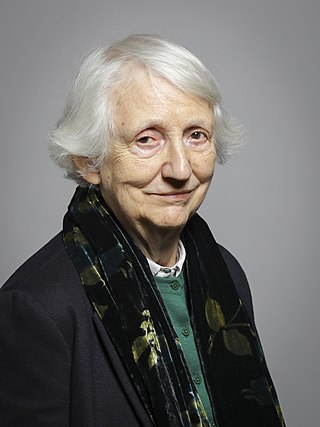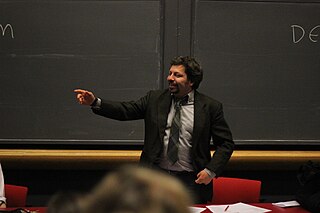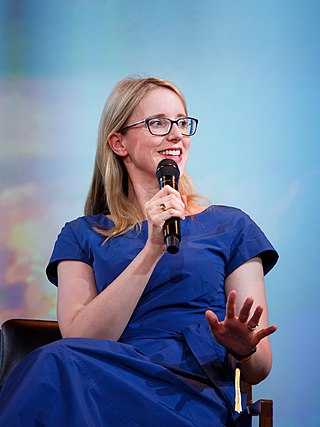Related Research Articles
Bioethics is both a field of study and professional practice, interested in ethical issues related to health, including those emerging from advances in biology, medicine, and technologies. It proposes the discussion about moral discernment in society and it is often related to medical policy and practice, but also to broader questions as environment, well-being and public health. Bioethics is concerned with the ethical questions that arise in the relationships among life sciences, biotechnology, medicine, politics, law, theology and philosophy. It includes the study of values relating to primary care, other branches of medicine, ethical education in science, animal, and environmental ethics, and public health.

Onora Sylvia O'Neill, Baroness O'Neill of Bengarve, is a British philosopher and a crossbench member of the House of Lords.

Gregory E. Pence is an American philosopher.
Hans-Martin Sass, is a bioethicist. He is a Professor Emeritus of Philosophy at Ruhr University, Bochum, Germany, and a Senior Research Scholar Emeritus at the Kennedy Institute of Ethics at Georgetown University, Washington DC.

Donna L. Dickenson is an American philosopher who specializes in medical ethics. She is Emeritus Professor of Medical Ethics and Humanities at the University of London, fellow of the Ethox and HeLEX Centres at the University of Oxford, and visiting fellow at the Centre for Ethics in Medicine, University of Bristol.
The Centre for Human Bioethics is the previous name of a research and teaching centre at Monash University, based in the Faculty of Arts. The Centre is now known as the Monash Bioethics Centre. It focusses on the branch of ethics known as bioethics, a field relating to biological science and medicine. It was founded in October 1980 by Professors Peter Singer and Helga Kuhse, as the first centre in Australia devoted to bioethics, and one of the first in the world.
Simon Caney is Professor of Political Theory at the University of Warwick and a member of the Nuffield Council on Bioethics.
The following outline is provided as an overview of and topical guide to ethics.
The Nuffield Council on Bioethics is a UK-based independent charitable body, which examines and reports on bioethical issues raised by new advances in biological and medical research. Established in 1991, the Council is funded by the Nuffield Foundation, the Medical Research Council and the Wellcome Trust. The Council has been described by the media as a 'leading ethics watchdog', which 'never shrinks from the unthinkable'.
Ruth Macklin is an American philosopher and retired professor of bioethics.
Judith Andre is a philosophy professor (retired) and virtue theorist. She earned her Ph.D. at Michigan State University in 1979 and has taught courses on ethical issues in global public health, ethics and development, animal welfare, and virtue theory at Old Dominion University and Michigan State University before retiring.

Korean beauty standards have become a well-known feature of Korean culture. In 2015, a global survey by the International Society of Aesthetic Plastic Surgeons placed South Korea in the top ten of countries who had the highest rate of cosmetic surgeries.

S. Matthew Liao is an American philosopher specializing in bioethics and normative ethics. He is internationally known for his work on topics including children’s rights and human rights, novel reproductive technologies, neuroethics, and the ethics of artificial intelligence. Liao currently holds the Arthur Zitrin Chair of Bioethics, and is the Director of the Center for Bioethics and Affiliated Professor in the Department of Philosophy at New York University. He has previously held appointments at Oxford, Johns Hopkins, Georgetown, and Princeton.

This article is about the Nir Eyal (bioethicist). For the author, see Nir Eyal.

Vardit Ravitsky is a bioethicist, researcher, and author. She is president and CEO of The Hastings Center, a full professor at the University of Montreal, and a senior lecturer on Global Health and Social Medicine at Harvard Medical School. She is immediate-past president and current vice-president of the International Association of Bioethics, and the director of Ethics and Health at the Center for Research on Ethics. She is a Fellow of the Pierre Elliott Trudeau Foundation, where she chaired the COVID-19 Impact Committee. She is also Fellow of The Hastings Center and of the Canadian Academy of Health Sciences.
Gilbert Meilaender is a prominent American Lutheran bioethicist and theologian. He is Senior Research Professor of Theology at Valparaiso University, and served on the President's Council on Bioethics from its founding in 2002 until its dissolution in 2009.
Maureen Kelley is the Wallace and Mona Wu Chair in Bioethics at Wake Forest University's Centre for Bioethics, Health & Society. Previous to this role she held a Chair in Ethics Education and Professor of Medicine at Oregon Health & Science University, Portland, and Professor of Bioethics at the Nuffield Department of Population Health, University of Oxford, England from 2016 to 2022. She has previously served on the World Health Organization's COVID-19 research ethics review committee.

Alena Michaela Buyx is a German medical ethicist. She has been Chair of the German Ethics Council since 2020.

Patricia Kingori is a British Kenyan sociologist who is a professor at the University of Oxford. Her research considers the experiences of frontline health workers around the world. She is particularly interested in misinformation and pseudoscience. In 2015, Kingori was included on the Powerlist.
Nancy Ann Silbergeld Jecker is a bioethicist, philosopher, and author. She is Professor of Bioethics and Humanities at the University of Washington School of Medicine, Department of Bioethics and Humanities, with Adjunct Professorships at the university's Department of Philosophy, School of Law, and Department of Global Health. She also holds visiting professorships at the University of Johannesburg, Gauteng South Africa and the Chinese University of Hong Kong Centre for Bioethics
References
- ↑ "Who we are - Centre for the Study of Global Ethics".
- ↑ "Warwick|Philosophy|Academic Staff|Heather Widdows".
- ↑ Widdows, Heather (May 2018). Perfect Me. Princeton University Press. ISBN 9780691160078.
- ↑ Singer, Maya (7 February 2020). "Do French Women Really Have the Secret to Aging Gracefully?". Vogue. Retrieved 10 July 2020.
- ↑ "Books That Changed Me: Bri Lee". The Sydney Morning Herald. 4 January 2020. Retrieved 10 July 2020.
- ↑ "Graduations Edinburgh", The Herald, 14 July 1995, retrieved 15 April 2021
- ↑ "Impact case study (REF3b)".
- ↑ "Cosmetic procedures: ethical issues" (PDF). Nuffield Council on Bioethics.
- ↑ "UK Parliament Publications". publications.parliament.uk.
- ↑ Widdows, Heather (May 2018). Perfect Me. Princeton University Press. ISBN 9780691160078.
- ↑ "The 19 Best Books of 2018". The Atlantic. 26 December 2018. Retrieved 10 July 2020.
- ↑ "100 Books to Read in a Lifetime (2020)". Edarabia. Retrieved 10 July 2020.
- ↑ Singer, Maya (7 February 2020). "Do French Women Really Have the Secret to Aging Gracefully?". Vogue. Retrieved 10 July 2020.
- ↑ "What's the Next 'Instagram Face'?". PAPER. 21 May 2020. Retrieved 10 July 2020.
- ↑ "Dr. Ourian on Cosmetic Surgery's 'Holy Grail'". PAPER. 21 May 2020. Retrieved 10 July 2020.
- ↑ "People - Beauty Demands".
- ↑ "Beauty Demands". Beauty Demands. Retrieved 10 July 2020.
- ↑ "Beauty Demands Briefing Paper" (PDF). 1 June 2016.
- ↑ "About - Beauty Demands".
- ↑ "Everyday Lookism". www.everydaylookism.com. Retrieved 23 January 2023.
- ↑ "New campaign to end the effects of lookism by collective social action". 10 June 2019.
- ↑ Kiek, Tim (9 June 2020). "The dark side of the video call boom". The Telegraph. ISSN 0307-1235 . Retrieved 10 July 2020.
- ↑ Paxton, Charlotte (16 June 2019). "'You'd be gorgeous if you lost weight' - the worst body-shaming taunts". birminghammail. Retrieved 10 July 2020.
- ↑ "BONUS EPISODE: Everyday Lookism with Professor Heather Widdows".
- ↑ "Is cosmetic surgery the new acceptable face of womanhood?". TheGuardian.com . 27 June 2015.
- ↑ "The rise of non-surgical beauty: 'My mum said my lip looked like a rubber dinghy'". TheGuardian.com . 3 April 2017.
- ↑ Hess, Amanda (23 April 2018). "'I Feel Pretty' and the Rise of Beauty-Standard Denialism". The New York Times.
- ↑ "Do French Women Really Have the Secret to Aging Gracefully?". 7 February 2020.
- ↑ "Call to limit body-editing apps for children - CBBC Newsround".
- ↑ "How Isolating in Quarantine Has Been Detrimental to Our Body Image". 17 October 2020.
- ↑ "Construction sociale ou fruit de l'évolution ? Débat intense autour de notre attirance pour le " visage Instagram "". Le Monde.fr. 15 July 2022.